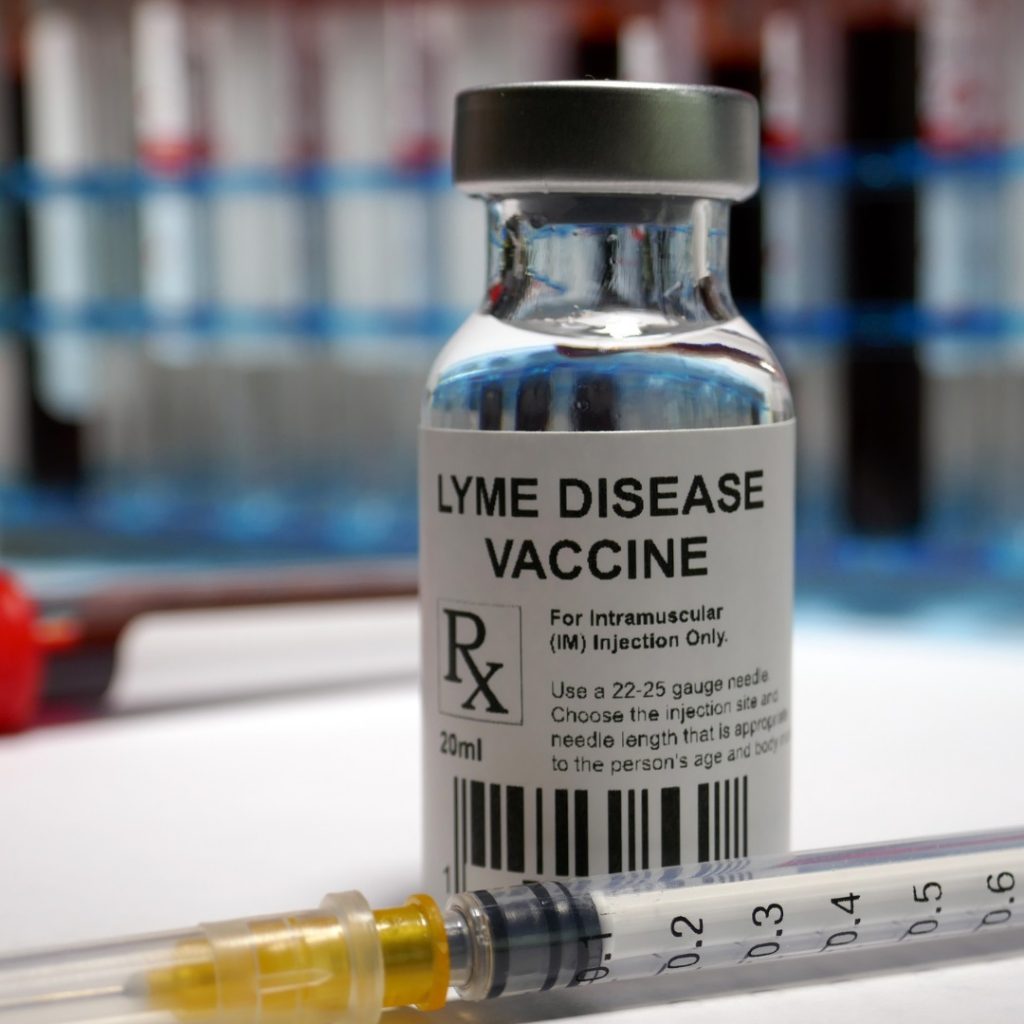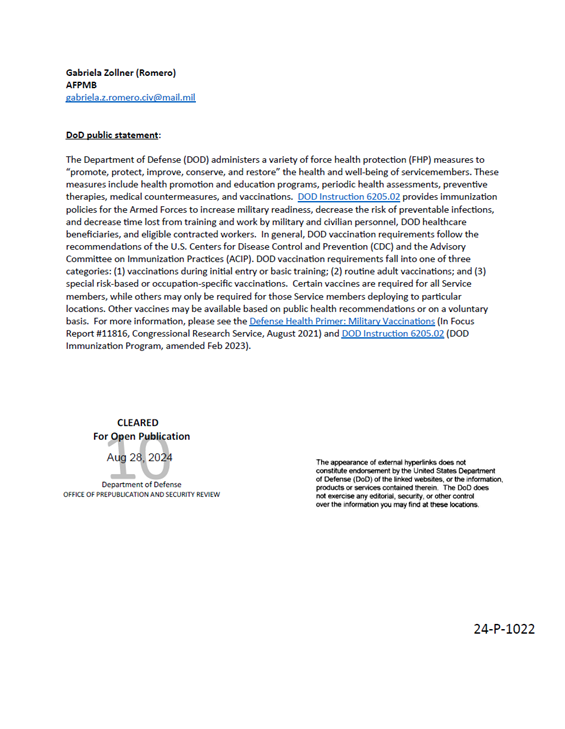Answers to some–not all–of our questions about upcoming Lyme vaccine

In March 2024, I was one of seven Lyme disease advocates invited to attend the “Lyme Disease Vaccine—Technical Consultation” at the CDC in Atlanta.
Our goal was to develop a list of questions to help inform the Lyme vaccine program development and implementation if the Pfizer VLA15 Lyme vaccine (currently in phase 3 clinical trials) is approved for use in the U.S. (Click here to learn more about the meeting in Atlanta.)
We were incredibly lucky to have had Lyme Disease Association president Patricia Smith participate in the meeting. Few people in this country had as much first-hand experience with the roll-out of the first Lyme vaccine, LYMErix, which was pulled from the market 20 years ago. Sadly, Pat–who was a powerful force and tireless Lyme disease advocate–passed away in August. Rest assured, I listened closely to what she said at the meeting. I will make sure her questions and concerns for the safety of patients live on.
After the meeting, Dr. Susanna Visser, who coordinated the meeting with Pfizer and the CDC, divided the questions into groups that would be answered separately by Pfizer, the CDC, the FDA and the Department of Defense (DoD). (Click here to see the full list of 80+ questions.)
Below are answers to questions that were directed to federal representatives at CDC and the DoD. We await comments from the FDA.
For background, the CDC has not been involved in the clinical trials and has no intellectual property tied to the Lyme vaccine candidate.
However, if the vaccine is FDA approved and recommended by the CDC’s Advisory Committee on Immunization Practices, the CDC will take the lead in developing and implementing a Lyme vaccine program.
We’re told that comments from Pfizer, a private corporation, will come separately.
Lyme Disease Vaccine Technical Consultation, March 7-8, 2024
Responses to Questions for Federal Agencies
Background
On March 7, 2024, a small group of expert-advocates were convened to compile a list of their questions about a future Lyme disease vaccine, particularly the VLA15 vaccine given that it was the only vaccine candidate being evaluated in phase 3 clinical trials at the time. The following are questions for federal agencies, contributed by the participants. Below are responses from CDC and DoD, with answers still pending for FDA.
Questions for CDC
General Questions
Would Pfizer be able to convene a meeting at which the VLA clinical trial findings could be presented to the broad research and non-research Lyme community?
- Defer to Pfizer.
- This question may have been mis-attributed to CDC during the meeting because there was interest by the meeting attendees for CDC to hosting the meeting.
Questions About Adverse Events and Side Effects
When a person reports to VAERS, is their report/symptom placed into a coding system (used by the FDA or others), or are their symptoms investigated and analyzed at face value?
- The Vaccine Adverse Event Reporting System (VAERS) accepts and analyzes reports of adverse events. Each VAERS report is assigned a VAERS identification number. This number can be used to provide additional information about the adverse event described in the initial report to VAERS, if necessary.
- VAERS will only reach out to the reporting individual for additional information if “essential fields” of the VAERS form are not filled out, or to ask if the described person has recovered from the adverse event.
- The VAERS program follows up on reports classified as serious by attempting to obtain medical records to better understand the event. These requests for medical records are made directly to health institutions or public health authorities that create and maintain medical records. The medical records are added to the permanent record under the VAERS ID, compliant with privacy standards.
- Individuals can request their VAERS record officially by submitting a request. See VAERS FAQs for more information.
What is the reporting and investigation process of VAERS?
- Anyone can submit a report to VAERS. Healthcare providers and vaccine manufacturers are legally required to report certain events after vaccination.
- If a vaccine appears to be potentially associated with a health problem, CDC and FDA investigate further and take action if needed.
- VAERS staff attempt to collect additional information from healthcare providers and clinicians about adverse events described in serious reports.
- VAERS data alone cannot determine if the vaccine caused the reported adverse event. Establishing a causal relationship requires rigorous scientific assessment and consideration of multiple factors beyond just VAERS reports alone.
Do we currently (during the phase 3 clinical trial) have public access to adverse event data from the clinical trials (through VAERS or otherwise)?
- VAERS does not collect adverse event data from clinical trials. Public access to adverse event data from clinical trials is only available if the vaccine manufacturer releases those data. Safety data from clinical trials may be presented by manufacturers at public meetings of the advisory committees of both FDA and CDC, i.e., VRBPAC and ACIP, respectively.
- Some data on clinical trials can be found at gov, a website and online database of clinical research studies and information about their results. Information is submitted to this website by the study sponsor or principal investigator.
Does VAERS receive reports pre-licensure? If so, how are VAERS reports considered by FDA for licensure?
- VAERS accepts reports after a vaccine is authorized or approved by FDA.
- VAERS does occasionally receive reports pre-licensure (e.g., from a participant in a clinical trial). Such reports are not kept in VAERS and are referred to the principal investigator of the clinical study.
- Find more information about data collection, investigation, analysis, and communication about adverse safety events reported to VAERS on CDC’s VAERS website.
Questions About Post-Licensure
What can be shared publicly about the ACIP member vetting process?
- ACIP consists of 15 experts who are voting members and are responsible for making vaccine recommendations. The Secretary of the U.S. Department of Health and Human Services (DHHS) selects these members after an application and nomination process. Specific information about the application and vetting process can be found on the ACIP membership page.
What is the conflict-of-interest process for vetting ACIP members? If a person is shown to have a conflict of interest, is there a process to remove them? Is this information disclosed?
- Visit CDC’s Advisory Committee on Immunization Practices (ACIP) website on membership qualifications to read about conflict of interest and other requirements for ACIP membership.
Will VLA15 be considered for the Vaccines for Children Program? Do states have an independent role in determining if a vaccine is included in the Vaccines for Children program?
- The Vaccines for Children Program covers vaccines that are recommended by ACIP and approved by CDC, which includes all vaccines for children ages 18 years and younger.
Would special populations get recommendations in the future, even if they were not included in the clinical trials?
- After a vaccine is licensed for general use, additional data on vaccine effectiveness and safety among subpopulations could lead to further ACIP review. Examples of subpopulations include people who are breastfeeding or pregnant, or people with weakened immune systems or a history of prior disease.
Questions about Communications and Rollout
What are CDC’s plans for vaccine rollout, including website content? How will CDC incorporate information about vaccine safety monitoring systems in its vaccine rollout?
- CDC is interested in understanding perceptions, questions, and concerns that the public may have about a Lyme disease vaccine to inform a future vaccine rollout.
- If a Lyme disease vaccine is approved as safe and effective by the Food and Drug Administration (FDA), CDC will work with the ACIPto develop recommendations about who and where in the U.S. the public might benefit from a Lyme disease vaccine.
- CDC will communicate these recommendations to the public and healthcare providers via the CDC website, social media, and other platforms in collaboration with public health and clinical partners. Safety and efficacy data will be included in communications whenever possible.
Questions for FDA: Pending
Questions About the VLA15 Trial
- Does FDA have a statement on why Pfizer discontinued a large number of participants in their US VALOR study?
- Why did FDA clear Care Access (contractor)?
- Why were FDA’s findings different than Pfizer’s?
- If VAERS receives reports pre-licensure, how are these reports considered by FDA for licensure?
Questions for DoD
Questions About Post-Licensure
What is the vaccine recommendation process for DoD?
- The Department of Defense (DOD) administers a variety of force health protection (FHP) measures to “promote, protect, improve, conserve, and restore” the health and well-being of These measures include health promotion and education programs, periodic health assessments, preventive therapies, medical countermeasures, and vaccinations. DOD Instruction 6205.02 provides immunization policies for the Armed Forces to increase military readiness, decrease the risk of preventable infections, and decrease time lost from training and work by military and civilian personnel, DOD healthcare beneficiaries, and eligible contracted workers. In general, DOD vaccination requirements follow the recommendations of the U.S. Centers for Disease Control and Prevention (CDC) and the Advisory Committee on Immunization Practices (ACIP). DOD vaccination requirements fall into one of three categories: (1) vaccinations during initial entry or basic training; (2) routine adult vaccinations; and (3) special risk-based or occupation-specific vaccinations. Certain vaccines are required for all Service members, while others may only be required for those Service members deploying to particular locations. Other vaccines may be available based on public health recommendations or on a voluntary basis. For more information, please see the Defense Health Primer: Military Vaccinations (In Focus Report #11816, Congressional Research Service, August 2021) and DOD Instruction 6205.02 (DOD Immunization Program, amended Feb 2023).
- See Appendix for cleared DoD communication.
Appendix: DoD Cleared Public Statement
LymeSci is written by Lonnie Marcum, a physical therapist and mother of a daughter with Lyme. She served two terms on a subcommittee of the federal Tick-Borne Disease Working Group. Follow her on Twitter: @LonnieRhea Email her at: lmarcum@lymedisease.org.





















We invite you to comment on our Facebook page.
Visit LymeDisease.org Facebook Page